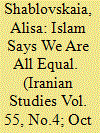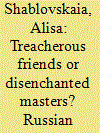| Srl | Item |
| 1 |
ID:
186910


|
|
|
|
|
| Summary/Abstract |
The early 1920s witnessed an upsurge in Soviet interest in Islam on an international scale. This interest was to a large extent guided by Great Game logic, at a time when the idea of Islamic jihad against the British was extremely popular all over the Middle East. Contrary to the common assumption that the Marxist rationale of the Bolsheviks excluded any possibility of integrating religion into Soviet policy, the highest authorities in Moscow adopted a rather opportunistic position with regard to Islam both at home and abroad. Drawing mainly on Russian archival sources, this study questions the origins and nature of the Islamic turn in Soviet discourse, diplomacy, and propaganda in Iran. The article concludes that although the Soviet rapprochement with some members of the Iranian clergy and the integration of religious elements into communist propaganda were carried out for the sake of short-term geopolitical goals, these maneuvers were much conditioned by Soviet domestic policy and post–World War I regional interdependencies.
|
|
|
|
|
|
|
|
|
|
|
|
|
|
|
|
| 2 |
ID:
181287


|
|
|
|
|
| Summary/Abstract |
Since the beginning of the XIXth century the relations of dependency and inter-dependency between the Iranian monarch and foreign officials became an integral part of Iranian political life. During the Iranian Constitutional Movement (1905–1911) nascent Iranian nationalism harshly condemned the Qajars as tyrants and lackeys of foreign powers. Muhammad ‘Ali Shah (r.1907–1909), the first Qajar sovereign who had to share his powers with the representative assembly, was quickly discredited by his political opponents as despot and Russian puppet, an accusation that seemed to be proved when the deposed Muhammad ‘Ali returned to Iran from his exile and launched a military campaign. This study represents an attempt to shed more light on the relations between Muhammad ‘Ali and Russian officials, especially in the context of his return campaign of 1911. Relying mostly on unpublished Russian archival sources, this paper proposes a critical assessment of Muhammad ‘Ali’s link with Russia, avoiding the habitual reductionist scheme of ‘patron-client’ relations and putting more emphasis on the role of agency in Russian foreign policy in Iran as well as the proper intentions and ambitions of the Qajar princely elite.
|
|
|
|
|
|
|
|
|
|
|
|
|
|
|
|